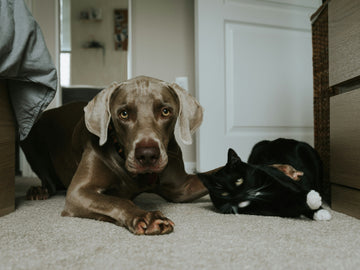Every pet has a secret language—silent, subtle, but incredibly expressive. They don’t speak our words, yet their tails, ears, eyes, and even the way they walk tell entire stories. Learning to understand these signals is like unlocking a new way of communicating, one that deepens the bond between you and your furry friend.
Why Body Language Matters
Our pets live in a world where their voices aren’t made of words, but gestures. A wagging tail might be a cheerful hello, while tucked ears whisper unease. If we pause and pay attention, we begin to hear them without sound:
-
Recognize happiness, stress, or fear before it turns into action.
-
Strengthen the trust between you and your pet.
-
Prevent miscommunication that could lead to anxiety or aggression.
-
Care for their emotional well-being as much as their physical health.
Universal Clues Across Species
Though every species has its own dialect, some signs transcend differences:
-
Relaxation: Loose muscles, soft gazes, calm breathing.
-
Excitement: Upright posture, eager eyes, maybe a joyful wag or a soft purr.
-
Anxiety or Fear: Lowered bodies, tucked tails, trembling, or hiding.
-
Aggression: Stiff frames, bared teeth, sharp stares—a clear boundary drawn.
In these unspoken exchanges lies the opportunity to respond with patience and care.
Listening to Your Dog’s Story
Dogs are wonderfully expressive, often wearing their feelings in plain sight. But every wag or bow has shades of meaning.
-
The Tail: A slow wag can be a quiet smile; a stiff, fast wag can mean nerves. A tucked tail tells you the dog is uneasy, while a raised one signals confidence—or a warning to tread carefully.
-
The Ears: Perked forward ears show curiosity; flattened ears hint at submission or stress.
-
The Face: A relaxed mouth says peace, while bared teeth are the clearest of warnings.
-
The Body: The playful “bow” is an unmistakable invitation, while a crouched, shrinking posture reveals fear.
And here’s where tools meet understanding: a good leash isn’t just about control, it’s about communication. For example, Bobopal’s hands-free dog leash belt allows your dog to move naturally, so their body language is easier to observe without tension pulling you both in different directions.
Decoding Your Cat’s Subtle Signals
Cats are poets of subtlety. They rarely shout their feelings, but if you watch closely, they’ll let you into their quiet world:
-
Tail Tales: Upright and confident, puffed in defense, or flicking in irritation.
-
Ears as Antennas: Forward for curiosity, pinned back for fear or warning.
-
The Eyes: Slow blinks are cat kisses; dilated pupils could mean wonder—or alarm.
-
Body Posture: An arched back bristles with fear, while an exposed belly shows trust (though not always an invitation to touch).
The Quiet Voices of Small Pets and Birds
Even the tiniest companions have volumes to say:
-
Rabbits flop over in trust, or thump to sound the alarm.
-
Guinea pigs leap with joy in “popcorning” or chatter their teeth in irritation.
-
Birds fluff their feathers when cozy or click their beaks when annoyed. Their eyes, narrowing and widening, flash emotion in an instant.
How to Respond with Grace
Understanding is only the first step—how we respond completes the conversation.
-
Give Space: Respect fear and irritation; closeness can wait until they invite it.
-
Reward Calm: Praise, treats, or a gentle stroke reinforce peace and trust.
-
Stay Steady: Your calm presence becomes their anchor.
-
Respect Boundaries: Not every pet craves endless attention; honor their rhythms.
A Bond Beyond Words
When you learn to read your pet’s body language, you discover a dialogue without words, rich with trust and meaning. Every glance, every tail flick, every tilt of the ears becomes part of a story you share together.
At Bobopal, we believe that caring for pets isn’t just about products—it’s about connection. Whether you’re on a quiet evening walk with a hands-free leash or simply sitting beside your pet at home, every gesture matters. Listen with your eyes, respond with your heart, and you’ll find your pet has been speaking to you all along.






